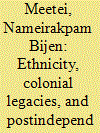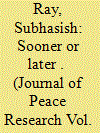| Srl | Item |
| 1 |
ID:
129842


|
|
|
|
|
| Publication |
2014.
|
| Summary/Abstract |
The idea of indigenousness has been evoked to legitimize group exclusive claims including separate territories in North-East India. By analyzing experiences in Meghalaya and Manipur, the article argues that the colonial ethnic categorization that produced "ethnic conglomerates" has generated a number of problems leading to conflict in the postindependence period. First, certain composite identities have been formed by bringing together under a single umbrella a range of distinct indigenous groups' identity, often leading to the suppression of smaller identities within the larger group. Thus, the smaller groups struggle to have their own identities recognized. Furthermore, the imposed ethnic categorization has enabled the contemporary political class, which has simply perpetuated the colonial system, to use cultural identity and "indigenousness" instrumentally to their own advantage.
|
|
|
|
|
|
|
|
|
|
|
|
|
|
|
|
| 2 |
ID:
148480


|
|
|
|
|
| Summary/Abstract |
A well-known finding in the literature on ethnic conflict is that new states are more prone to ethnic conflict than old states. What are less well known, however, are the mechanisms through which independence leads to ethnic conflict. This lacuna is surprising since the literature offers different mechanisms to explain the result, each pointing to very distinct policy responses. This article examines these mechanisms by analyzing variations in the time from independence until an ethnic group engaged in armed conflict in ex-British colonies using an original colonial legacies dataset covering 177 ethnic groups in 33 ex-colonies. My analysis reveals that the main group-level triggers of early conflict onset are perceptions of backwardness, exclusion from political power on the eve of independence, downgrading of political status in the immediate aftermath of independence, and being regionally based. More generally, I find that shorter durations of post-independence peace are better explained by subjective evaluations of group worth instead of rational assessments of the costs and benefits of mobilization. These findings indicate that power-sharing arrangements may be a sine qua non for stabilizing new states in divided societies since what is at play in these contexts are complex considerations of group status that cannot be accommodated by non-ethnic institutional arrangements.
|
|
|
|
|
|
|
|
|
|
|
|
|
|
|
|